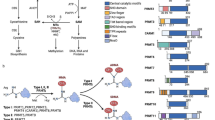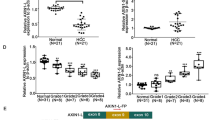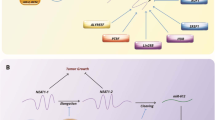Abstract
N6-methyladenosine (m6A) is the most common posttranscriptional RNA modification and plays significant roles in physiological and pathological progression. Here, we probed the functions and mechanism of the m6A reader YTH domain containing 2 (YTHDC2) in Lung Adenocarcinoma (LUAD) tumorigenesis. Levels of genes and proteins of YTHDC2 and Mitochondrial ribosomal protein L7/L12 (MRPL12) were assayed by quantitative real-time polymerase chain reaction, western blotting and Immunohistochemistry (IHC) analyses. In vitro analysis was conducted using 5-ethynyl-2′-deoxyuridine (EdU), colony formation, flow cytometry, and transwell assays, respectively. In vivo assay was performed by using the mouse lung adenocarcinoma model. The methylated RNA immunoprecipitation (MeRIP) assay was used to detect the m6A modification profile of MRPL12 mRNA. YTHDC2 was lowly expressed in lung adenocarcinoma tissues and cells. Overexpression of YTHDC2 suppressed the proliferation, invasion and migration of lung adenocarcinoma cells, but induced cell apoptosis. As expected, forced expression of YTHDC2 hindered lung adenocarcinoma tumor growth in vivo. Mechanistically, YTHDC2 preferentially bound to m6A-modified MRPL12 mRNA and destabilized its expression. MRPL12 was highly expressed in lung adenocarcinoma tissues and cells, and MRPL12 silencing repressed the growth and mobility of lung adenocarcinoma cells. Moreover, MRPL12 upregulation attenuated the anticancer activity of YTHDC2 in lung adenocarcinoma cells. In vivo assay also showed YTHDC2 suppressed tumor growth in the lung adenocarcinoma mouse model via downregulating MRPL12. The m6A reader YTHDC2 repressed lung adenocarcinoma tumorigenesis by destabilizing MRPL12 in an m6A-dependent manner.






Similar content being viewed by others
Data Availability
The datasets used and analyzed during the current study are available from the corresponding author on reasonable request.
References
Sung, H., Ferlay, J., Siegel, R. L., Laversanne, M., Soerjomataram, I., Jemal, A., et al. (2021). Global cancer statistics 2020: GLOBOCAN estimates of incidence and mortality worldwide for 36 cancers in 185 Countries. CA: A Cancer Journal for Clinicians, 71, 209–249.
Shi, J., Hua, X., Zhu, B., Ravichandran, S., Wang, M., Nguyen, C., et al. (2016). Somatic genomics and clinical features of lung adenocarcinoma: A retrospective study. PLoS Medicine, 13, e1002162.
Hao, C. C., Xu, C. Y., Zhao, X. Y., Luo, J. N., Wang, G., Zhao, L. H., et al. (2020). Up-regulation of VANGL1 by IGF2BPs and miR-29b-3p attenuates the detrimental effect of irradiation on lung adenocarcinoma. Journal of Experimental & Clinical Cancer Research, 39, 256.
Zhao, W., Qi, X., Liu, L., Ma, S., Liu, J., & Wu, J. (2020). Epigenetic regulation of m(6)A modifications in human cancer. Molecular Therapy Nucleic Acids, 19, 405–412.
Liu, J., Eckert, M. A., Harada, B. T., Liu, S. M., Lu, Z., Yu, K., et al. (2018). m(6)A mRNA methylation regulates AKT activity to promote the proliferation and tumorigenicity of endometrial cancer. Nature Cell Biology, 20, 1074–1083.
Chen, Y., Wang, J., Xu, D., Xiang, Z., Ding, J., Yang, X., et al. (2021). m(6)A mRNA methylation regulates testosterone synthesis through modulating autophagy in Leydig cells. Autophagy, 17, 457–475.
Zhao, B. S., Roundtree, I. A., & He, C. (2017). Post-transcriptional gene regulation by mRNA modifications. Nature Reviews Molecular Cell Biology, 18, 31–42.
An, Y., & Duan, H. (2022). The role of m6A RNA methylation in cancer metabolism. Molecular Cancer, 21, 14.
Chen, X. Y., Zhang, J., & Zhu, J. S. (2019). The role of m(6)A RNA methylation in human cancer. Molecular Cancer, 18, 103.
He, L., Li, H., Wu, A., Peng, Y., Shu, G., & Yin, G. (2019). Functions of N6-methyladenosine and its role in cancer. Molecular Cancer, 18, 176.
Allis, C. D., & Jenuwein, T. (2016). The molecular hallmarks of epigenetic control. Nature Reviews Genetics, 17, 487–500.
Hsu, P. J., Zhu, Y., Ma, H., Guo, Y., Shi, X., Liu, Y., et al. (2017). Ythdc2 is an N(6)-methyladenosine binding protein that regulates mammalian spermatogenesis. Cell Research, 27, 1115–1127.
Wang, X., Hu, Y., Li, X., Zhu, C., & Chen, F. (2023). YTHDC2-mediated m6A mRNA modification of Id3 suppresses cisplatin resistance in non-small cell lung cancer. Journal of Thoracic Disease, 15, 1247–1257.
Yuan, W., Chen, S., Li, B., Han, X., Meng, B., Zou, Y., et al. (2022). The N6-methyladenosine reader protein YTHDC2 promotes gastric cancer progression via enhancing YAP mRNA translation. Translational Oncology, 16, 101308.
Ma, L., Chen, T., Zhang, X., Miao, Y., Tian, X., Yu, K., et al. (2021). The m(6)A reader YTHDC2 inhibits lung adenocarcinoma tumorigenesis by suppressing SLC7A11-dependent antioxidant function. Redox Biology, 38, 101801.
Jiang, X., Liu, B., Nie, Z., Duan, L., Xiong, Q., Jin, Z., et al. (2021). The role of m6A modification in the biological functions and diseases. Signal Transduction and Targeted Therapy, 6, 74.
Liu, J., Harada, B. T., & He, C. (2019). Regulation of gene expression by N(6)-methyladenosine in cancer. Trends in Cell Biology, 29, 487–499.
Huang, H., Weng, H., & Chen, J. (2020). m(6)A modification in coding and non-coding RNAs: Roles and therapeutic implications in cancer. Cancer Cell, 37, 270–288.
Paris, J., Morgan, M., Campos, J., Spencer, G. J., Shmakova, A., Ivanova, I., et al. (2019). Targeting the RNA m(6)A Reader YTHDF2 selectively compromises cancer stem cells in acute myeloid leukemia. Cell Stem Cell, 25, 137-148.e136.
Fang, D., Ou, X., Sun, K., Zhou, X., Li, Y., Shi, P., et al. (2022). m6A modification-mediated lncRNA TP53TG1 inhibits gastric cancer progression by regulating CIP2A stability. Cancer Science, 113, 4135–4150.
Liu, T., Wei, Q., Jin, J., Luo, Q., Liu, Y., Yang, Y., et al. (2020). The m6A reader YTHDF1 promotes ovarian cancer progression via augmenting EIF3C translation. Nucleic Acids Research, 48, 3816–3831.
Song, P., Feng, L., Li, J., Dai, D., Zhu, L., Wang, C., et al. (2020). β-catenin represses miR455-3p to stimulate m6A modification of HSF1 mRNA and promote its translation in colorectal cancer. Molecular Cancer, 19, 129.
Liao, S., Sun, H., & Xu, C. (2018). YTH domain: A family of N(6)-methyladenosine (m(6)A) readers. Genomics, Proteomics & Bioinformatics, 16, 99–107.
Ji, X., Chu, L., Su, D., Sun, J., Song, P., Sun, S., et al. (2023). MRPL12-ANT3 interaction involves in acute kidney injury via regulating MPTP of tubular epithelial cells. iScience, 26, 106656.
Lu, Y., Gu, X., Wan, Q., Feng, H., & Liu, Y. (2021). Co-immunofluorescence of MRPL12 and Nrf2 in HK2 Cells. Bio-Protocol, 11, e4191.
Kim, H. J., Maiti, P., & Barrientos, A. (2017). Mitochondrial ribosomes in cancer. Seminars in Cancer Biology, 47, 67–81.
Gu, X., Liu, Y., Wang, N., Zhen, J., Zhang, B., Hou, S., et al. (2021). Transcription of MRPL12 regulated by Nrf2 contributes to the mitochondrial dysfunction in diabetic kidney disease. Free Radical Biology & Medicine, 164, 329–340.
Chengcheng, L., Raza, S. H. A., Shengchen, Y., Mohammedsaleh, Z. M., Shater, A. F., Saleh, F. M., et al. (2022). Bioinformatics role of the WGCNA analysis and co-expression network identifies of prognostic marker in lung cancer. Saudi Journal of Biological, 29, 3519–3527.
Hu, Y., Liu, Y., Ma, C., & Ai, K. (2023). MRPL12 acts as A novel prognostic biomarker involved in immune cell infiltration and tumor progression of lung adenocarcinoma. International Journal of Molecular Sciences, 24, 2762.
Funding
None.
Author information
Authors and Affiliations
Contributions
YS and YL: designed and supervised the study, conducted the experiments and drafted the manuscript. PW: collected and analyzed the data. LC: contributed the methodology and prepared the figures. JH: operated the software and edited the manuscript. All authors reviewed the manuscript.
Corresponding author
Ethics declarations
Conflict of interest
The authors declare that they have no conflict of interest.
Ethical Approval
This study was authorized by the Ethics Committee of Xuchang Central Hospital (approval number: 2023-01-002), and written informed consent was collected from all patients. The protocols of animal experiments were approved by the ethics committee of Xuchang Central Hospital (approval number: 2023-01-003).
Consent to Participate
Not applicable.
Additional information
Publisher's Note
Springer Nature remains neutral with regard to jurisdictional claims in published maps and institutional affiliations.
Supplementary Information
Below is the link to the electronic supplementary material.
12033_2023_1002_MOESM1_ESM.tif
Supplementary file1 (TIF 206 KB) The effects of YTHDC2 silencing on the expression of 8 top elevated genes. qRT-PCR analysis for the expression of 8 top elevated genes that were negatively correlated with YTHDC2 in the LinkedOmics database in A549 cells after YTHDC2 knockdown
Rights and permissions
Springer Nature or its licensor (e.g. a society or other partner) holds exclusive rights to this article under a publishing agreement with the author(s) or other rightsholder(s); author self-archiving of the accepted manuscript version of this article is solely governed by the terms of such publishing agreement and applicable law.
About this article
Cite this article
Sun, Y., Liu, Y., Wang, P. et al. The m6A Reader YTHDC2 Suppresses Lung Adenocarcinoma Tumorigenesis by Destabilizing MRPL12. Mol Biotechnol 66, 1051–1061 (2024). https://doi.org/10.1007/s12033-023-01002-8
Received:
Accepted:
Published:
Issue Date:
DOI: https://doi.org/10.1007/s12033-023-01002-8




